The Preacher’s Son
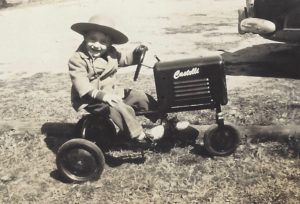
Sunday morning, Mom stood at the bedroom door all dressed up for church. “Time to put on your Sunday suit, Kenny.”
Still in my Roy Rogers pajamas, I lay in bed beside Dad, who was asleep, or pretending to be asleep. “I want to stay home with Dad.”
“Tommy?” Mom said.
Dad didn’t stir.
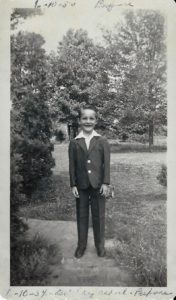
Mom gave us a worried look, then walked away. When I heard our Hudson Hornet pull out of the driveway and head up Route 60 toward the church, I got dressed and ran outside, gloriously free to do whatever I wanted.
I wasn’t born a preacher’s son. Dad was a car dealer when I was a little boy, and he refused to go to church. He was my get-out-of-church free card, and I played it every week until the summer of 1954 when I turned seven years old.
That summer, Dad wanted to move to Hagerstown, Maryland. Mom didn’t want to go. She agreed to the move only after Dad promised to go to church.
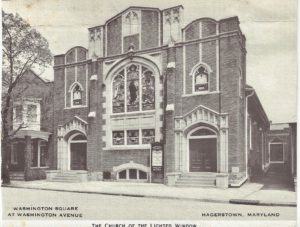
In Hagerstown, Dad got out of bed bright and early every Sunday, put on a blue suit and a starched white shirt, helped Mom stuff me into a torturously uncomfortable miniature version of his outfit, shoved me into the Hudson’s back seat, and drove us all to The Church of the Lighted Window.
I hated my little suit. Hated church. Hated Sunday School. I whined, cried hysterically, and threw fits. Nothing worked. After a long struggle, I gave up and zombie-trudged my way through the Sunday morning ordeals.
Meanwhile, Dad warmed up to the church, and our family commitment to it deepened. Dad served as an usher; Mom became a Sunday School teacher; they volunteered me to be an acolyte; and the Church chose Dad to be its treasurer and then its lay leader.
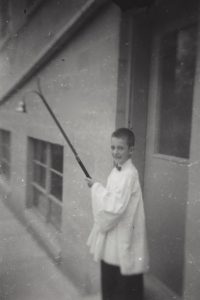
In 1956, any lingering hope of returning to the Sunday morning good times died for good when Dad attended a Christian retreat, found Jesus, and decided to become a preacher. I was upset because I didn’t want to be a preacher’s kid, but when I learned what the Methodist Church would require Dad to do, I calmed down. With no formal education beyond high school, he had to take years of college courses. Even if he stuck with it, which I doubted, his ordination was so far in the future it didn’t seem real.
Time passed. We moved back to Virginia and joined a big church in Hampton. Dad doggedly plowed through scores of courses, but the Church kept piling on new requirements.
In June, 1961, I thought he was still years away from attaining his goal when he came home from the Methodist Annual Conference with shocking news. Although the Church still wouldn’t accept him as a full-fledged minister, they had designated him a “supply pastor” and had assigned him to the Albemarle Circuit, four churches located in the mountains 175 miles away.
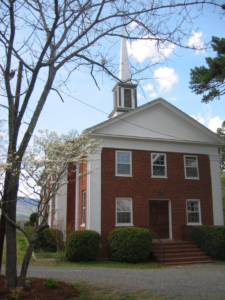
The appointment was effective immediately. We had one week to relocate. We loaded our belongings in a truck. Tears blurred my view of our home as we drove away. I had just finished the eighth grade. All my school friends lived in town. I didn’t get to say goodbye, and I never saw any of them again.
The parsonage, an old two-story white frame house with a tin roof, sat down the road from Mount Moriah Methodist Church in White Hall, Virginia, a rural farm town. About fifty people stood in the yard to greet us when we pulled up in the moving van.
Dad led us through the crowd, and we ended up standing on the front porch overlooking a sea of uplifted faces. As he spoke to them, I panicked. Emotionally, I was still the seven year old who wanted to stay home with Dad Sunday mornings, but Dad’s appointment had turned me into someone different, someone I didn’t know. I was now the preacher’s son, a role I didn’t choose or want.
Standing on the porch in front of that crowd, I felt like all eyes were on me. I assumed they expected me to be a paradigm of Christian virtue. I didn’t know how a devout teenager was supposed to act, so I did my best to fake it. I stood stiffly with my hands clasped together in front of me, straining to maintain a beatific, angelic smile. On the outside I was trying to impersonate a preacher’s kid saturated with the Holy Spirit. On the inside I was so scared and miserable I could barely breathe.
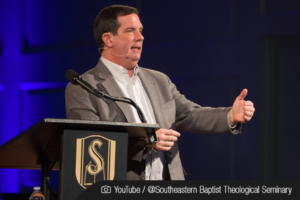
The anxiety that consumed me that day plagues most preacher’s kids. Thom Rainer, a pastor, wrote a blog post in 2013, asking church members to be more understanding of his children. To his surprise, the post went viral and he received more than 500 comments, most of them from preacher’s kids. They complained about living in a glass house where they thought church members watched their every move and expected them to be perfect. They believed they couldn’t question Christian doctrine or express doubts without being labeled rebellious. They worried that their slightest transgression might destroy their parents’ image in the church. And most of them were desperately lonely.
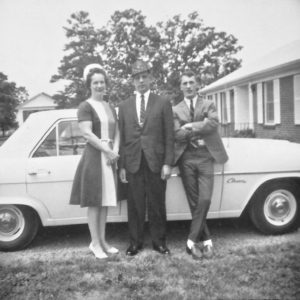
I experienced all of those emotions my first few weeks in White Hall, but my life changed for the better as suddenly and decisively as my first day as a preacher’s son had turned sour. One of the church women asked Mom if I could spend the day with her son. Mom knew I was lonely and shoved me forward. With a big smile and a sunny personality, my new pal was easy to like. We spent the day running all over his family’s farm. It was close to the most fun I’d ever had. I went back the next day. And the next.
When school started in the fall, most of the kids I met didn’t know I was a preacher’s son, and those who did know didn’t seem to care. As it turned out in the end, no one cared except me.
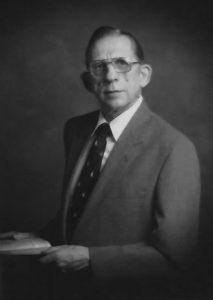
I was fortunate Dad was assigned to the Albemarle Circuit. White Hall was a special place. The people who went to Mount Moriah were thoughtful and kind. They accepted me for who I was and didn’t criticize me or judge me. That’s how they approached everyone, preacher’s sons included. It was the best place I and my brothers could have grown up.
Fifty years after we left White Hall, I sat by Dad’s deathbed and held his hand while he slept. After a long while, he stirred; his eyes opened; and he saw me there. He shifted in the bed and knitted his brow. “Was it hard for you?” he said. “Being the preacher’s boy?”
I was surprised by the question. We’d never spoken about this. In the beginning of his ministry, he had worked so hard just to survive that I thought he hadn’t noticed my struggle.
I considered my answer for a good while before I spoke. “It wasn’t hard,” I finally said, meaning it. “It was one of the best things that ever happened to me.”
He looked at me for a few moments, then put a trembling hand over his eyes. “Good people at Mount Moriah.” He took a deep breath. “Wish we could go back to White Hall one more time.”
“Me, too, Dad. Me, too.”
Post Script: Apparently, there was an advantage to being a preacher’s son that somehow eluded me. In 1969, Dusty Springfield won a Grammy, singing in a sexy, brassy voice about a preacher’s son named Billy Ray. “The only one who could ever reach me/ Was the son of a preacher man/ The only boy who could ever teach me/ Was the son of a preacher man/ Yes he was, he was, oooh, yes he was.”
Suffice it to say, Kenny Bill was no Billy Ray.



September 1, 2019 @ 4:00 pm
A great story Ken. I’m not a preacher’s son but am a preacher. I pray my children’s memories are as rich as yours. Thank you for sharing this perspective.
September 2, 2019 @ 8:40 am
Thanks, Dan. The advantages far outweighed the burdens in my case, but the burdens were real. My advice, for what it’s worth, is to watch and listen and talk it out when you see an issue.
August 31, 2019 @ 7:08 am
Kenny,I had the good fortune to have a Preachers son for a teacher and the other son for a good friend.I was blessed to have both.God sends his sheep the the greenest pastures.White Hall was lucky to have the Oder Family there.
August 31, 2019 @ 7:28 am
Thanks, Larry! We’re both blessed that we landed in White Hall and that you came into our lives.
August 30, 2019 @ 6:16 pm
I loved reading this Ken! You continue to amaze me with your ability to touch our hearts trough your words! I’m reading Old Wounds to the Heart now! I am so proud to be your friend and so grateful to you for your friendship and generosity.
August 31, 2019 @ 7:26 am
Thanks, Maria! Proud to be your friend, too!
August 30, 2019 @ 4:28 pm
Well that brought tears to my eyes thank you for sharing that heartfelt personal story ?
August 30, 2019 @ 4:52 pm
Thanks, Janet!
August 30, 2019 @ 2:26 pm
That was the most beautiful story I have had the pleasure of reading. It touched my heart and made me cry. Thank you so much for sharing it. I know that little boy deep down was proud of his dad and as he became a man, he father was proud of him. God Bless them both.
August 30, 2019 @ 2:48 pm
Thanks, Tina! The stories about my youth and family are the most pleasure to write, too. They take me back to a very happy time.
August 30, 2019 @ 2:10 pm
Tears in my eyes while reading about the people ar Mt. Moriah. And especially your dad’s comment to you about them. My folks counted your mom and dad as good friends.
August 30, 2019 @ 2:46 pm
We all loved Mount Moriah and White Hall. And Mom and Dad counted your folks as good friends, too.
August 30, 2019 @ 1:35 pm
So much fun to read!! Our perceptions as children stay with us for a long time even if they change as we mature .……
August 30, 2019 @ 2:44 pm
Thanks, Betty Lou! So true.
August 30, 2019 @ 1:20 pm
I always enjoy your stories.
August 30, 2019 @ 2:43 pm
Thanks, Sharon, for following my blog and for the good words! Great to hear from you.
August 30, 2019 @ 12:33 pm
Great tribute to your dad, Ken
August 30, 2019 @ 2:43 pm
Thanks, Jim! Great to hear from you.
August 30, 2019 @ 12:31 pm
Ken — as usual, a great read.
(And nice socks!)
August 30, 2019 @ 2:42 pm
Thanks, Mike! White socks were out of style by then but no one told me!